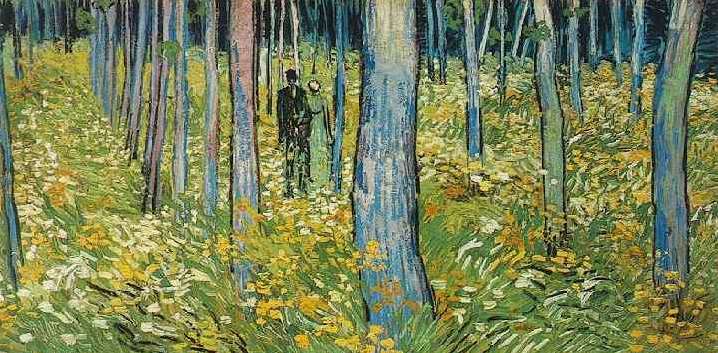
“For my part I know nothing with any certainty, but the sight of the stars makes me dream” – Van Gogh
Recently, on a short holiday to Woodbridge, Suffolk, we took a walk in Rendlesham Forest. My husband, David, and children strode ahead of me, sure of the path. Of course, that kind of certainty is always easier when it’s a planned walk, complete with painted posts to guide the way. We barely met a soul that morning, but (after the initial townie fear of leaving our car alone in the middle of nowhere) we soon felt perfectly safe and certain of our route.
Yet I couldn’t help but wonder what it would have been like if one of those posts had been taken away. It was a two-hour walk and without doubt, we would have become hopelessly lost.
I was reminded on that walk of the words of the novelist John Fowles who compares writing fiction to a woodland walk. He extends the metaphor beautifully in his book The Tree
.
“Behind every path and every form of expression one does finally choose,” he writes, “lie the ghosts of all those that one did not. I do not plan my fiction any more than I normally plan woodland walks; I follow the path that seems most promising at any given point, not some itinerary decided before entry. I am quite sure this is not some kind of rationalization, or irrationalization, after the fact; that having discovered I write fiction in a disgracefully haphazard sort of way, I now hit on the passage through an unknown wood as an analogy.”
That passage, as many of my former students know, has always been influential in my work. I believe that fiction must grow organically – that too much pre-planning can get in the way of our best work. (There has to be a balance, in truth, but for me, the ‘being lost’ has to come first.) Yet if we’re to believe that writing fiction is like walking through an unknown woodland (or God forbid, forest!) then we also have to get comfortable about the idea of working without ‘posts’ to show us the way. We have to be at ease with ‘being lost’ and accept uncertainty as part of our experience.
That’s not always easy in practice, but I have found that over the course of a writing life it has become at least familiar – and interesting. Only last week, for example, I came away from a writing session full of uncertainty. I’m revising my fourth novel. It had been an enjoyable session, I’d felt engaged with the work and yet it struck me that the relationship between my protagonist and one of the secondary characters wasn’t dynamic enough. There wasn’t enough development in that relationship – and it worried me that I hadn’t noticed that before. How could I have come thus far and not seen it? Wasn’t it a bit too late in the process for me to realise the error?
Yet I reminded myself – as these thoughts coursed through my head – that this fear of having got it ‘wrong’ is perfectly normal. It’s a signal. If I were walking through a forest one afternoon for example (without posts) and I intended to head west, but suddenly realised that the sun was behind me, I’d feel that same slight dread in my gut. But in fact, if I looked at it logically, I’d simply have a piece of information that would help me adjust my direction and get back on track. It’s the same thing with writing fiction. If we can embrace uncertainty and see it as a signal – our unconscious mind telling us that something isn’t working and therefore that something needs to be changed – then we can see that ‘not knowing’ is a positive thing. It leads us to asking the right questions, to discovering answers.
Uncertainty is the human condition. Perhaps it’s time we got used to it! The social philosopher Erich Fromm wrote: “The quest for certainty blocks the search for meaning. Uncertainty is the very condition to impel man to unfold his powers.” As Van Gogh acknowledged, we can know nothing with any certainty, but dreaming is open to all of us.

I’ve been discussing this theme recently with clients and what has struck many of us is that it is so easy to confuse uncertainty with negative emotion – and thus to allow it to block the creative impulse. But if we can go beyond this, if we can look at uncertainty as I imagine Benjamin Zander (conductor of the Boston Philharmonic Orchestra and co-author of The Art of Possibility) would – and say, in Zander’s words ‘How Fascinating!’ – then we’ve taken the first step towards embracing uncertainty. We do not need to overcome it but to allow it as part of our experience – to use it as a positive creative force.
This week’s action:
What are you feeling uncertain about in your life at the moment? What are you feeling uncertain about in your creative work?
What will happen if you accept this uncertainty? Or can you use the questions the uncertainty throws up to enrich the creative process?
I’d love to hear your thoughts and questions…



 Sarah Kane’s 4.48 Psychosis – On Creativity and Despair
Sarah Kane’s 4.48 Psychosis – On Creativity and Despair
Leave a Reply